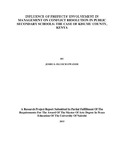| dc.description.abstract | Most schools have registered violent conflicts that have led to property destruction. In the light of this, the purpose of this study was to assess the influence of prefects’ involvement in management on conflict resolution in public secondary schools in Muhoroni Sub-County, Kisumu County, Kenya. The objectives were: to examine the influence of prefects’ involvement in communication on conflict resolution; to
establish the influence of prefects’ involvement in arbitration on conflict resolution; to investigate the influence of prefects’ involvement in instilling discipline on conflict resolution and to find out the influence of prefects’ involvement in decision making on conflict resolution. The study used descriptive survey design with a total of 33 public secondary schools that had 33 Principals, 33 Guidance and counseling teachers, a total of 292 prefects (head boys, head girls and class secretaries) and 1772 Form
Three students. This gave a target population of 2130. A stratified sampling technique was used to select a sample size of 10 schools. Each of the sampled schools provided 1 Principal, 1 guidance and counseling teacher, 1 head girl and/ or head boy and 4 class secretaries and 35 Form Three students. The researcher personally conducted interviews to the principals and issued questionnaires to the guidance and
counseling teachers, prefects and students to collect data. Piloting was done in two public secondary schools. Split half method was used to ascertain the reliability. The researcher applied content validity to measure the relevance of the research instrument. Data collected were coded and analyzed using Statistical Package for Social Sciences (SPSS). They were then analyzed using descriptive statistics and the results presented using frequency distribution tables and percentages. The study found out that
involving prefects in communication enhances conflict resolution. This was supported by 60% of the principals who strongly agreed while the other 40% agreed to it. Similarly, 50% of the guidance and counseling teachers, 51.8% of the prefects and 35.1% of the students agreed. The study findings also revealed that prefects’ involvement in arbitration enhances conflict resolution. This was evidenced by 70% of the principals, 60% of the guidance and counseling teachers, 44.6% of the prefects and 39.4% of
the students who agreed. To support this further, in each category of respondents, there was significant percentage of respondents who strongly agreed to this finding. The study further found out that involving prefects in instilling discipline enhances conflict resolution in public secondary schools. This was supported by 50% of the principals who agreed and 70% of the guidance and counseling teachers, 39.3% of the prefects and 40.6% of the students who agreed to it. However, the study noted that this should be
done with limits whereby too sensitive cases of indiscipline should be reported to the administration. Additionally, the study findings revealed that involving prefects in decision making on matters regarding school management enhances conflict resolution to a great extent. 80% of the principals, 50% of the guidance and counseling teachers, 33.9% of the prefects and 32.9% of the students indicated that involving prefects in decision making enhances conflict resolution to a great extent. Based on these findings, it was concluded that: involving prefects in communication enhances conflict resolution in public secondary schools; prefects’ involvement in arbitration enhances conflict resolution in public secondary schools; involving prefects in instilling discipline enhances conflict resolution in public secondary schools; involving prefects in decision making on matters regarding school management enhances conflict resolution in public secondary schools. It was therefore recommended that: each school
should issue prefects with information handbooks that define clearly the communication protocol as well as general policies on communication in a school set up; coming up with a department in the students council mandated to listen to and arbitrate disputes that arise among students as soon as they occur; developing a policy on discipline that clearly defines offences and their penalties; an overhaul in the management structure to allow prefects are to participate in decision making on matters touching the
students such as routine matters, school rules and regulations, school policy formulation. | en_US |

